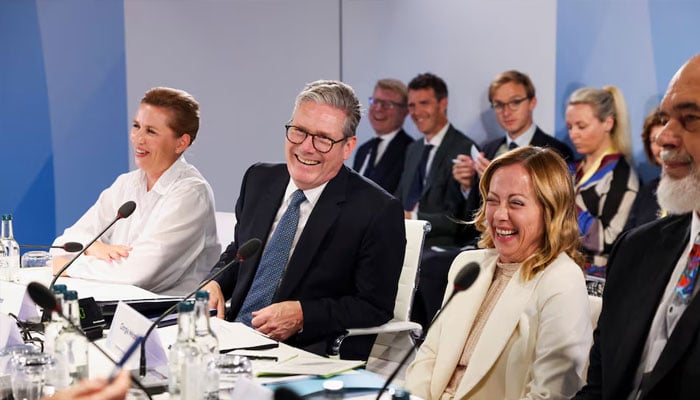Starmer hails European unity on Ukraine, tackling migration
BLENHEIM PALACE, England: Britain’s new prime minister, Keir Starmer, hailed European unity on Thursday, saying deeper defence and security cooperation would better support Ukraine while shared intelligence could help tackle illegal migration.
Closing a meeting of the European Political Community (EPC) of more than 40 nations at Blenheim Palace, the birthplace of Winston Churchill, Starmer said stronger relationships had been developed at the summit, the first step in his efforts to reset post-Brexit ties with the European Union.
His push for closer cooperation takes place against the backdrop of the possible election of Donald Trump, who alongside his pick for White House running mate, J.D. Vance, has suggested cutting U.S. support for Ukraine, leaving Europe to cover the loss.
“We are going to deepen our cooperation on defence and security and on illegal migration, where we are resetting our approach,” Starmer told a news conference at the EPC, a grouping distinct from the EU that was created after Russia’s full-scale invasion of Ukraine in 2022. He had offered other European leaders a clean slate, distancing himself from the previous government, which had threatened to withdraw from an international treaty on human rights and to send asylum seekers to Rwanda.
Fresh from his first international trip as prime minister to NATO in Washington, Starmer took to the international stage again, calling on Europe to do more to support Ukraine. He said the summit had made a commitment to crack down on Russia’s so-called “shadow fleet” of oil tankers used to break sanctions. However, Ukrainian President Volodymyr Zelenskiy again called on Western allies to allow long-range strikes on Russia, in particular on military airfields.
So far, NATO members have taken varying approaches to how Ukraine can use weapons they supply. But in a move that should better coordinate military support for Ukraine, NATO Secretary-General Jens Stoltenberg said a command would be operational in Germany from September.
Hungarian Prime Minister Viktor Orban, who has the current rotating presidency of the EU and whose talks this month with Russian President Vladimir Putin drew a rebuke from other EU members as well as from Zelenskiy, took a different tone, saying the solution to war in Ukraine would be found at the negotiating table, not the battlefield.
German Chancellor Olaf Scholz said Orban was representing only his own country, not the EU. Starmer has been determined to reset EU ties after Britain’s vote to leave the bloc in 2016 sparked years of rancour.
He has said he does not see Britain rejoining the single market or customs union in his lifetime.
-
 FAA Shuts Down El Paso Airport, Flights Suspended For 10 Days: Here’s Why
FAA Shuts Down El Paso Airport, Flights Suspended For 10 Days: Here’s Why -
 Kate Middleton, Prince William's Major Plan Revealed After Statement On Andrew Scandal
Kate Middleton, Prince William's Major Plan Revealed After Statement On Andrew Scandal -
 Teacher Abused Children Worldwide For 55 Years, Kept USB Log Of Assaults
Teacher Abused Children Worldwide For 55 Years, Kept USB Log Of Assaults -
 Nick Jonas Set To Showcase Acting Skills In Upcoming Thriller 'Bodyman'
Nick Jonas Set To Showcase Acting Skills In Upcoming Thriller 'Bodyman' -
 Milano-Cortina 2026: Assessing Italy’s Winter Olympics Economic Growth
Milano-Cortina 2026: Assessing Italy’s Winter Olympics Economic Growth -
 Chris, Liam Hemsworth Support Their Father Post Alzheimer’s Diagnosis
Chris, Liam Hemsworth Support Their Father Post Alzheimer’s Diagnosis -
 Savannah Guthrie Expresses Fresh Hope As Person Detained For Questioning Over Kidnapping Of Nancy
Savannah Guthrie Expresses Fresh Hope As Person Detained For Questioning Over Kidnapping Of Nancy -
 ByteDance Suspends Viral Seedance 2.0 Photo-to-voice Feature: Here’s Why
ByteDance Suspends Viral Seedance 2.0 Photo-to-voice Feature: Here’s Why -
 Tom Hanks Diabetes 2 Management Strategy Laid Bare
Tom Hanks Diabetes 2 Management Strategy Laid Bare -
 Bad Bunny Wins Hearts With Sweet Gesture At Super Bowl Halftime Show
Bad Bunny Wins Hearts With Sweet Gesture At Super Bowl Halftime Show -
 Why Angelina Jolie Loves Her 'scars' Following Double Mastectomy
Why Angelina Jolie Loves Her 'scars' Following Double Mastectomy -
 ‘World Is In Peril’: Anthropic AI Safety Researcher Resigns, Warns Of Global Risks
‘World Is In Peril’: Anthropic AI Safety Researcher Resigns, Warns Of Global Risks -
 Meghan Markle Receives Apology As Andrew Puts Monarchy In Much Bigger Scandal
Meghan Markle Receives Apology As Andrew Puts Monarchy In Much Bigger Scandal -
 Catherine O’Hara Becomes Beacon Of Hope For Rectal Cancer Patients
Catherine O’Hara Becomes Beacon Of Hope For Rectal Cancer Patients -
 Nancy Guthrie: Is She Alive? Former FBI Director Shares Possibilities On 10th Day Of Kidnapping
Nancy Guthrie: Is She Alive? Former FBI Director Shares Possibilities On 10th Day Of Kidnapping -
 Siemens Energy Profit Surges Nearly Threefold Amid AI Boom For Gas Turbines, Grids
Siemens Energy Profit Surges Nearly Threefold Amid AI Boom For Gas Turbines, Grids




